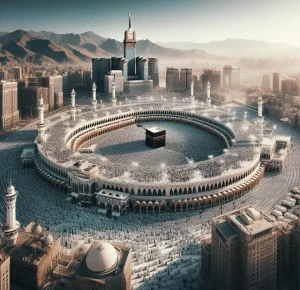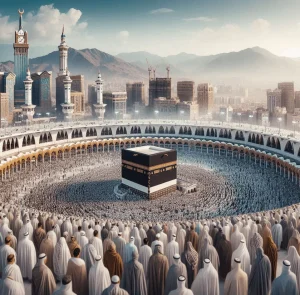Table of Contents
Hajj Experience Embarking on the sacred journey of Hajj is a dream come true for millions of Muslims around the globe. As one of the Five Pillars of Islam, Hajj is not merely a ritual but a profound spiritual quest that enriches the soul and strengthens the bond with Allah. Each year, pilgrims from diverse backgrounds come together in Mecca, unified in their devotion and purpose. This article delves into the Hajj Experience, drawing on insights and reflections from those who have had the privilege of undertaking this sacred journey.

The Spiritual Significance of Hajj
Hajj Experience is an unparalleled spiritual pilgrimage, mandated for every Muslim who is physically and financially able to perform it at least once in their lifetime. The journey symbolizes the ultimate act of worship and submission to Allah. Pilgrims retrace the steps of the Prophet Ibrahim (Abraham), his wife Hajar (Hagar), and their son Ismail (Ishmael), engaging in rites that commemorate their faith and dedication.
The Pillars of Hajj
The Hajj Experience is structured around specific rituals, each carrying deep spiritual meaning:
- Ihram: Pilgrims enter a state of spiritual purity, donning simple white garments that symbolize equality and humility before Allah.
- Tawaf: Circling the Kaaba seven times in a counterclockwise direction, reflecting the unity of the believers in the worship of the One God.
- Sa’i: Walking seven times between the hills of Safa and Marwah, commemorating Hajar’s search for water for her son Ismail.
- Arafat: Standing on the plain of Arafat on the 9th day of Dhu al-Hijjah, praying and seeking forgiveness, symbolizing the climax of Hajj.
- Muzdalifah: Collecting pebbles for the symbolic stoning of the devil, reinforcing the rejection of evil and temptation.
- Ramy al-Jamarat: Stoning the three pillars in Mina, representing the defiance of Satan.
- Eid al-Adha: The Festival of Sacrifice, commemorating Ibrahim’s willingness to sacrifice his son in obedience to Allah’s command.
These rituals, steeped in history and tradition, embody the core values of faith, sacrifice, and unity.
Personal Reflections on the Hajj Experience
To truly understand the profound impact of Hajj Experience, we turn to the voices of those who have completed the pilgrimage. Their reflections offer invaluable insights into the transformative nature of this spiritual journey.
The Call of the Kaaba
For many pilgrims, the first sight of the Kaaba is overwhelming. As Ali, a pilgrim from Indonesia, describes, “Seeing the Kaaba for the first time brought tears to my eyes. It was as if my heart was responding to a long-awaited call. The sense of peace and connection with Allah was indescribable.”
This moment often marks the beginning of a deeply personal journey, where pilgrims feel an immediate sense of belonging and divine presence.
The Humility of Ihram
Entering the state of Ihram is a powerful reminder of human equality and humility. Sara, a pilgrim from Egypt, shares, “Wearing the simple white garments made me realize how we are all equal in the eyes of Allah. It stripped away all worldly distinctions, reminding me that our true worth lies in our faith and actions.”
The simplicity of Ihram fosters a spirit of humility and introspection, allowing pilgrims to focus entirely on their spiritual quest.
The Unity of Tawaf
The act of circling the Kaaba alongside thousands of fellow believers is a poignant expression of unity. Ahmed, a pilgrim from Nigeria, reflects, “Performing Tawaf with people from every corner of the world was a powerful experience. Despite our different backgrounds, we were united in our worship. It felt like a glimpse of the unity that Islam promotes.”
Tawaf encapsulates the collective devotion of the Ummah, reinforcing the bonds of brotherhood and sisterhood in Islam.
The Sacrifice of Sa’i
The journey between Safa and Marwah honors Hajar’s perseverance and faith. Amina, a pilgrim from Pakistan, recounts, “As I walked between the hills, I thought of Hajar’s unwavering faith and determination. It was a humbling reminder of the sacrifices made by those before us and the importance of trusting in Allah’s plan.”
Sa’i serves as a poignant reminder of the trials faced by the prophets and their families, inspiring pilgrims to embody similar resilience and trust.
The Forgiveness of Arafat
Standing on the plain of Arafat is often described as the pinnacle of the Hajj Experience. Ibrahim, a pilgrim from the United States, describes his time at Arafat: “The Day of Arafat was the most spiritually intense day of my life. Standing there, praying and seeking forgiveness, I felt a profound sense of connection with Allah. It was a moment of deep reflection and renewal.”
The Day of Arafat symbolizes the ultimate opportunity for spiritual cleansing and seeking Allah’s mercy.
The Reflection of Muzdalifah
Collecting pebbles in Muzdalifah offers a time for reflection and preparation for the symbolic stoning. Fatimah, a pilgrim from Turkey, explains, “Spending the night under the open sky in Muzdalifah gave me time to reflect on my journey and the significance of the rituals. It was a serene moment of contemplation before the stoning of the devil.”
Muzdalifah provides a pause for spiritual introspection, preparing pilgrims for the final stages of their pilgrimage.
The Defiance of Ramy al-Jamarat
The act of stoning the pillars in Mina is a symbolic rejection of evil. Yusuf, a pilgrim from Malaysia, shares, “Throwing the pebbles at the pillars felt like a physical manifestation of my commitment to resist temptation and follow the righteous path. It was a powerful act of defiance against the forces of evil.”
Ramy al-Jamarat reinforces the pilgrim’s resolve to uphold their faith and reject sin.
The Joy of Eid al-Adha
The Festival of Sacrifice, marking the end of Hajj Experience, is a time of joy and gratitude. Zainab, a pilgrim from Morocco, reflects, “Celebrating Eid al-Adha with fellow pilgrims was a joyous conclusion to our journey. It was a time to give thanks for the blessings we had received and to share the spirit of sacrifice and generosity.”
Eid al-Adha symbolizes the culmination of the Hajj journey, celebrating the spirit of sacrifice and devotion.
Lessons from the Hajj Experience
The Hajj Experience imparts profound lessons that resonate long after the pilgrimage is over. These reflections offer valuable insights into the spiritual, social, and personal growth that Hajj fosters.
Spiritual Growth
Hajj is a catalyst for deep spiritual growth, fostering a closer relationship with Allah. Pilgrims often return with a renewed sense of faith, strengthened by their experiences and the rituals performed.
Social Unity
The pilgrimage fosters a sense of unity and brotherhood among Muslims from diverse backgrounds. The shared experience of Hajj breaks down barriers and promotes mutual understanding and respect.
Personal Transformation
Many pilgrims describe Hajj as a transformative journey that reshapes their perspective on life. The challenges and sacrifices encountered during the pilgrimage often lead to personal growth, increased patience, and a greater appreciation for the blessings in life.
Renewed Commitment
The Hajj Experience often results in a renewed commitment to Islamic principles and values. Pilgrims return with a strengthened resolve to live a life of righteousness, compassion, and devotion.
Tips for Future Pilgrims
Drawing from the reflections of past pilgrims, here are some tips for those planning to embark on their own Hajj Experience:
1. Prepare Spiritually and Physically
Hajj is both a spiritual and physical journey. Engage in regular prayer, study the rituals and their significance, and ensure you are physically fit to handle the demands of the pilgrimage.
2. Choose the Right Package
Select a Hajj package that fits your needs and budget. Consider the level of accommodation, transportation, and guidance provided. Opt for reputable travel agencies to ensure a smooth and organized experience.
3. Pack Wisely
Pack essentials such as comfortable clothing, personal hygiene items, medications, and a portable prayer mat. Keep your documents, including your passport and Hajj visa, secure and easily accessible.
4. Stay Hydrated and Healthy
The climate in Saudi Arabia can be harsh, so staying hydrated and taking care of your health is crucial. Carry a water bottle, wear sunscreen, and rest when needed to avoid exhaustion.
5. Embrace Patience and Flexibility
Hajj involves navigating large crowds and following strict schedules. Embrace patience and flexibility, understanding that challenges and delays are part of the experience.
6. Reflect and Engage
Take time to reflect on your journey and engage with fellow pilgrims. Sharing experiences and insights can enhance your spiritual journey and foster meaningful connections.
7. Focus on the Spiritual
Amidst the logistical challenges, keep your focus on the spiritual significance of Hajj Experience. Engage in regular prayer, recitation of the Quran, and acts of worship to deepen your connection with Allah.
Hajj Experience
The Hajj Experience is a journey like no other, offering profound spiritual insights and personal growth. Through the reflections of past pilgrims, we gain a deeper understanding of the transformative power of Hajj. As you prepare for your own pilgrimage, embrace the lessons and tips shared by those who have walked this sacred path before you. Celebrate your faith, strengthen your resolve, and immerse yourself in the spiritual journey of a lifetime.






More Stories
Experience the Incredible Peace of Hajj USA with a Journey of a Lifetime
The Ultimate Guide to a Joyful Hajj for Kids
Unlock the Inspiring Power of the Hajj Islam Definition for a Meaningful Journey